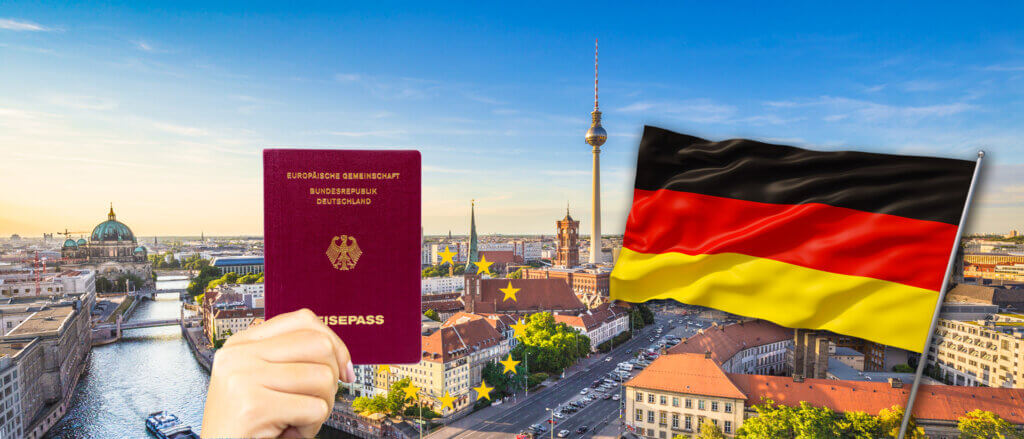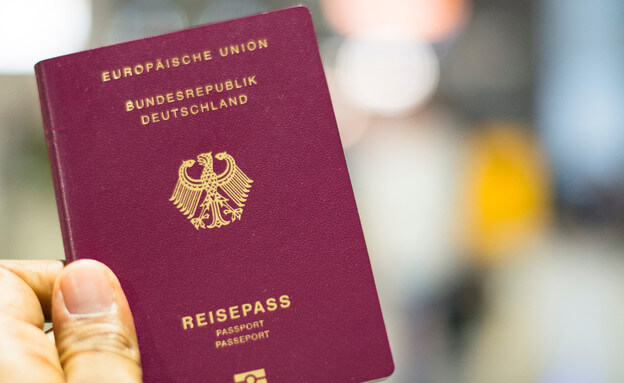German citizenship

Written by Attorney Eran Wagner
Table of contents
contact
share
Key Provisions of the German Citizenship Law
The Nazi regime’s persecution of the Jews included the blanket revocation of their German citizenship.
Since the end of World War II, Germany has been restoring German citizenship to Jews who lost their citizenship and to their descendants.
German citizenship law is based on consanguinity.
This means that German citizenship is not acquired by being born in Germany, but through
the entitlement to German citizenship of one of the parents.
The general rule is that a son or daughter of a German parent is entitled to German citizenship
There are, however, many exceptions to the aforementioned rule
In August 2021, eligibility was expanded, primarily by granting German citizenship to the descendants of those who were not German citizens but only German nationals persecuted by the Nazis, and through abolition of the discrimination against descendants of a mother with German citizenship (until then, the rights to inherit German citizenship were not the same for the offspring of a German mother as they were for those of a German father).
Important factors when evaluating entitlement to German citizenship, include, inter alia, whether the parent was persecuted by the Nazi regime, whether the parent is male or female, whether the parent lost his citizenship by marrying a foreign national, if and when the parent or the applicant for German citizenship acquired another foreign citizenship during his lifetime, whether the applicant was born to married parents, and if and when the applicant was adopted.
This is why the German Citizenship Law is very complex, and why in each and every case a thorough examination is required
| question | answer |
| Who is eligible for German citizenship? | Subject to exceptions, descendants of someone who was a German citizen. Descendants of someone who was a German resident of Jewish origin or was persecuted by the Nazis and left Germany after 30.01.1933 or whose parents remained in Germany after 30.01.1933. |
| Can German citizenship be granted to children? | Yes, descendants of someone who is eligible for German citizenship can also obtain German citizenship. There is no generational limit. |
| What about German citizenship for the spouse? | With some exceptions, citizenship is passed on through blood only and cannot be granted to a spouse. |
| Key advantages and benefits of citizenship: | Exemption from the need to obtain a visa for the US and other countries, the ability to live and work in any country belonging to the European Union, free academic studies and higher education, and more |
| How much does the process cost? | The price of obtaining a German passport depends on many factors and varies from case to case depending on the scope of the required treatment. |
| How long does it take to obtain the citizenship? | Each case is individual, but on average, German citizenship can be obtained within about two years from the date of application. |

German passport – Latest updates
A new law came into effect in August 2021 which enlarged significantly the circle of those entitled to German citizenship. Thus, at a rough estimate, there are hundreds of thousands of newly eligible individuals:
Expansion of entitlement regarding descendants of the victims of Nazi persecution, German citizens, as well as nationals who lived in Nazi Germany but were not German citizens.
Under the law, descendants of individuals who were persecuted on the basis of race (for example, Jews), religion, or political views between Hitler’s rise to power on January 30, 1933 and May 8, 1945, and who consequently lost, renounced, or were prevented from acquiring German citizenship, are entitled to German citizenship.
For example:
- Descendants of persons who were not naturalized after applying for naturalization in the past, or descendants of persons who were generally denied the possibility of naturalization, which would have been possible had they had applied for German citizenship. This encompasses a potentially enormous group of entitled persons, of descendants of people who lived in Germany before the rise of the Nazi regime and were not German citizens, but who, for example, held Polish citizenship or were even stateless (regardless of whether they were born in or outside of Germany), and who, had it not been for the Nazi regime’s laws, would have eventually acquired German citizenship.
Descendants of former German nationals, as distinct from German citizens , who renounced or lost their permanent place of residence in Germany which had existed prior to January 30, 1933.
Descendants of minor children, regardless of whether their permanent place of residence was only in Germany after January 30, 1933. In other words, there is no need for the parent to have been a German citizen.
It is enough to prove the permanent residency and persecution in Nazi Germany of one patrilineal/matrilineal forebear in order to be eligible for German citizenship.- Descendants of persons who lost or renounced their German citizenship before February 26, 1955.
For example, due to a foreign citizenship application, voluntary renunciation, or marriage to a foreign citizen. - Descendants of individuals who were denied the possibility of acquiring German citizenship due to marriage or other legal recognition.

Expansion of the circle of entitlement to encompass descendants of persons who were discriminated against on the basis of gender at birth – mainly relevant for descendants of a German mother.
In light of the changes, other than in exceptional cases, anyone born after 23.05.1949 to a German father, or mother, and their descendants, are entitled to German citizenship.
It makes no difference in this regard whether the German mother lost her German citizenship due to marrying a foreign citizen before the birth of their child or whether the child was born to a German father outside of wedlock.
Under the old law, a woman with German citizenship who married a foreign citizen before 01.04.1953 lost her citizenship, as did her children who were born after the marriage.
The amendment to the law facilitates the acquisition of German citizenship for her and all her descendants.
The aforementioned change is relevant to many Israelis, as there are numerous cases in which a woman with German citizenship married a man who did not have German citizenship, and they had children after 23.05.1949.
In the past, the descendants were precluded from acquiring citizenship in such cases, but now German law permits this.
For those born before 23.05.1949 and their descendants who did not acquire German citizenship at birth due to gender-based discrimination, there is still an option to obtain German citizenship through the naturalization process, although this is contingent upon passing German language proficiency tests.
Expansion of the circle of entitlement to cover descendants of émigrés from Danzig (Gdańsk) and other areas.
Between the World Wars, the city of Danzig (today Gdańsk) was an independent city-state.
In the past, it was very difficult for descendants of Danzig émigrés to regain their German citizenship.
With the latest update, the process is far simpler.
Who is entitled to a German passport and what change has been made to the law?
When can citizenship not be passed on – Important!
The following regulation applies only to a person whose German parent was born outside Germany after January 1, 2000, and he himself (the newborn infant) was born outside Germany and holds a foreign citizenship that is not German.
In such a case, German citizenship is not granted automatically to the infant, and a failure by the parent to take timely action shall deny the child the possibility of acquiring German citizenship.
In order for the newborn to be entitled to German citizenship, within a year from his date of birth, action must be taken and a request submitted to register his birth in the German Population Register, failing which the newborn shall lose his entitlement to German citizenship!
In other words, in the circumstances in question, which are relevant to most Israelis seeking citizenship, it is forbidden to wait and the infant’s citizenship should be arranged within one year of his date of birth.
It should be noted that the aforementioned regulation does not apply to those who received German citizenship under the laws which are predicated on receipt of citizenship due racial discrimination of descendants of citizens or nationals.
How do we operate?
A few words about the firm’s method of work
With over 20 years of experience in arranging European citizenship, the firm offers a VIPservice, meaning that we handle everything involved in the process of obtaining German citizenship with minimal hassle for the client through appropriate powers of attorney.
The client service is personal and under the direct supervision of the head of the firm, Advocate and Notary Eran Wagner, who is also a genealogist.
The service is all-inclusive (without exceptions) – and encompasses, inter alia, genealogical research, locating the documents relating to the applicant and his family in and gathering them from government offices and archives in Germany and Israel, notarized translations into German, apostille certifications, obtaining Israeli naturalization certificates and absence of criminal record certificates, payment of fees directly to the authorities in Germany, and of course, ongoing handling of the application with the German Consulate and government offices in Germany.
An application currently takes around two years to deal with, and the cost of the service varies according to the complexity of the case and the number of family members wishing to obtain citizenship.
Issuance of a biometric German passport
Anyone, including a minor, who applies for a German passport, must schedule an appointment and attend that appointment in person.
Minors (persons under the age of 18) must appear with both of their parents
Below is the link to the appointment scheduling system at the German Consulate in {a1}Tel Aviv{/a1}.
The following form (in English or German) must be filled out and brought to the appointment itself:
Form for a minor – To download the form {a1} click here {/a1}
Form for an adult – To download the form {a1} click here {/a1}
When the first application for the issuing of a passport is presented, it must be accompanied by all the relevant original documents in the German and/or Hebrew and/or English languages.
Details of the documents that must be brought to the appointment for issuing the passport:
- The appointment confirmation that was received by email.
- A completed application form (see the link above).
- For those who already have a current German passport;
The German parent must present his passport when submitting the first application for a German passport to be issued to a minor. - The applicant’s valid Israeli passport and if the application is for a minor, then his parents’ valid Israeli passports too.
- The Israeli identity card of the passport applicant, and in the case of a minor without an identity card, the Israeli identity card of the German parent, including the appendix in which the minor’s details appear.
- Two passport photographs
Care must be taken to ensure that the photographs are of the correct type and size
We recommend having the photographs taken at one of the following stores which are recognized by the German Consulate:
Photo Linof, 12 Ibn Gvirol Street, Tel Aviv 03-6957589, or Photo Shop, 33 Ibn Gvirol Street, Tel Aviv, telephone 03-5284795. - An original bilingual birth certificate of the passport applicant or a certificate in English.
- An original change of name certificate, if the passport applicant changed his given name or surname.
- The passport applicant’s German citizenship certificate or German naturalization certificate
- The passport applicant’s marriage certificate, and if the application is being submitted for a minor, his parents’ marriage certificate.
- A certificate from the German authorities regarding change of name after marriage and/or the children’s names (only if a relevant application has been submitted in the matter).
- A certificate regarding military service (relevant for an applicant who served in the IDF between 01.01.2000 and 06.07.2011).
The certificate must contain details of conscripted and/or career service, or alternatively confirmation of exemption from service, in the IDF). - If one exists, a letter from the German Ministry of Defense giving prior approval to the applicant’s service in the military between 01.01.2000 and 06.07.2011.
Additional notes and clarifications:
- A passport issued to an applicant under the age of 24 is valid for 6 years and costs 65 euros.
Payment can be made to the Consulate in euros, shekels, or by credit card (Visa or MasterCard). - A passport issued to an applicant over the age of 24 is valid for 10 years and costs 85 euros.
Payment can be made to the Consulate in euros, shekels, or by credit card (Visa or MasterCard).
- If your German passport is lost or stolen and you wish to renew it, you must present, in addition to the other paperwork, a police report confirming the loss or theft of the passport.
- Passports can be collected from the Consulate without prior appointment on Mondays and Wednesdays between the hours of 13:30 and 14:30.
- It normally takes about three months to receive the passport from the day it is ordered.
If the passport is needed urgently, an additional fee of 32 euros can be paid, and within this framework the passport shall be received within about a month.

Advantages, rights, and benefits conferred
by a German passport
A German passport (which every German citizen is actually entitled to) opens up a world of opportunities for its holder.
As German citizens, you will be able to live in one of the most advanced countries in Europe, enjoy a strong education system, social support for the elderly or unemployed, an advanced healthcare system and a rich cultural life, and even receive significant incentives from the state to start a business.
Additionally, you will receive a German retirement allowance (for those working in Germany) and you may enter many countries, including the United States, Australia and Canada, without having to obtain a visa.
Another advantage is the ability to travel between countries without using an Israeli passport.
Moreover, since Germany is a member of the European Union, it is possible to live, work, and study in any EU member state, obtain loans for property purchases, and study at higher education institutions at fully subsidized rates.
The various routes to obtaining a German passport
German law enables citizens of other countries to obtain German citizenship via a number of routes.
Legal advice from a professional lawyer who is well-versed in the intricacies of German law shall ensure that the most suitable route for you is chosen from among the following options:
- First route – If you are financially robust or have a highly sought-after profession in Germany, are proficient in the German language and are willing to forego any other citizenships you hold, you may apply for German citizenship.
In such cases, the authorities have the discretionary power to decide, and a supporting document from an attorney is an important factor in succeeding. - Second route – During the rule of the Nazi regime in Germany, Jews were stripped of their citizenship and were either exterminated in the Holocaust or fled for their lives to diaspora communities around the world.
If a person can prove he is indeed the descendant of a German national whose citizenship was revoked by the Nazis (on account of being Jewish and not for any other reason), then he and his descendants (without generational limitation) are entitled to receive German citizenship, without having to know the language or to demonstrate financial means. - Third route – The conditions for entitlement to German citizenship through descent have been equalized between men and women.
It is now possible for anyone who is a descendant of a woman (as opposed to a man), who was a German citizen, to acquire citizenship for himself and his descendants, regardless of whether they were born in or out of wedlock. - Fourth route – This new route enables the children, grandchildren, or great-grandchildren of a person who was not a German citizen but { a resident of Germany, and who was persecuted by the Germans while domiciled Germany, and who left Germany after January 1933 (for example, Polish citizens who arrived in Germany before 1933), to obtain German citizenship.
The routes described above were determined based on two elements which are regarded as very important in German law: The Nazi persecution of, and consanguinity with, Jews who were citizens and residents of Germany.
German citizenship for spouses
Anyone who meet the criteria for acquiring German citizenship is certain to ask himself: What about my spouse?
Indeed, there is a complex issue here which has been repeatedly addressed under German law – does the establishment of a spousal relationship between a German citizen and a non-German citizen in itself constitute grounds for the automatic granting of citizenship?
At the time of writing these lines, the partner may only apply for German citizenship if he or she has been married to a German citizen (or recognized as his or her common-law spouse under an agreement approved by the German court), and has resided with him or her in Germany for a period of at least 5 years.
In addition, the spouse who wishes to acquire German citizenship is required to renounce his Israeli citizenship (unlike descendants of Nazi victims, who are not required to relinquish their Israeli or any other citizenship).
It is important to note that each case is considered on its merits and the naturalization of a German citizen’s spouse may be denied for various reasons, such as non-employment or non-engagement in regular volunteer activity in Germany, a criminal background, etc.
It is also important to point out, that although it is more difficult to obtain German citizenship by virtue of marriage, the spouse of a German citizen may in any case reside with him or her in Germany, obtain permanent resident status, receive resident’s rights, and work lawfully and legitimately.
German citizenship for children
As aforesaid, German law regards consanguinity as a highly significant factor in matters of citizenship.
That is to say, regardless of where a person was born, what language he speaks, or his financial status – if he is the offspring of a German citizen, citizenship is granted to him automatically (although this case too entails considerable formalities).
In other words, German citizenship is granted to any child of a German citizen.
Minors over the age of 16 may submit the application independently. Below that age, the signature of both the German parent and the other parent is required.
It is very important to determine whether the German citizen’s child was born before or after his parent acquired German citizenship.
If the child was born before the parent became a German citizen, then in most cases process will be one of naturalization, as opposed to citizenship predicated on birth.
The two procedures are fundamentally different.
In any case, once a person acquires German citizenship, any children born to him thereafter shall be German citizens (although they must be registered as such with the German Embassy in Israel).
It is also important to emphasize, that since German law may also change for the worse over time, it is recommended that all citizenship applications, for both parents and children, be submitted simultaneously.
A case in point is is the recent change in Portuguese law, according to which children born to a Portuguese citizen are no longer automatically entitled to citizenship, but must now establish a connection to Portugal, which is very hard to prove and severely complicates the process.
German citizenship - frequently asked questions
Yes, a generation can be skipped.
There is no need or generational continuity.
Consent from the previous generations is not required.
However, documents regarding the previous generations are required, and we can obtain most of them.
Yes. If the applicant for citizenship holds multiple citizenships prior to acquiring German citizenship,
Yes, the firm can retrieve documents which prove the German citizenship as part of the VIP service.
In most cases, immigrants to Israel prior to 1933 retained their German citizenship and did not renounce and therefore, with the help of our research, there is a good chance of you being able to obtain German citizenship.
As a rule, German citizenship (nowadays) is also passed on to adopted children.
We’ll have to check the details, but there’s a good chance that you will succeed in obtaining German citizenship for the adopted children too.
Absolutely, we can submit the applications on their behalf too and they can obtain German citizenship and passports through the nearest German embassy to their home.
This is possible, but not recommended.
Since the large backlog at the German Citizenship Office means that each application can take around two years to process, it is advisable to submit applications for all the other family members simultaneously.
In addition, there’s no way of knowing whether the law shall remain as it is in the future.
Freedom to reside and work in all EU countries, free education in Germany, and the issuing of a U.S. visa without an interview at the U.S. Embassy.
Moreover, provided that offspring are registered within one year of birth, German citizenship can now be passed on from generation to generation.
No. The restoration of German citizenship is only relevant to descendants and therefore your wife shall not be included in the application.
Should you choose, however, to live in Europe, your wife would in principle be entitled to a residency and work permit and might also in time qualify for naturalization in Europe (although it may be contingent upon renunciation of her Israeli citizenship).
Yes. For minors, the consent of both parents is required.
Children over the age of 16 may apply independently without their parents’ consent.
Congratulations!
No. If a child is born after a parent has acquired German citizenship, the child is automatically a German citizen by birth.
However, his citizenship must be registered as soon as possible.
Without this constituting a substitute for advice from an attorney or an accountant, generally speaking, if you continue to reside in Israel and all your assets are located in Israel, obtaining German citizenship should have no tax repercussions.
Why is it worth doing the German passport issuance process with a law firm and not alone?
The issuance of German citizenship comes under the Citizenship Law and the changes that have occurred over the years by the German Ministry of Justice. In Germany, every procedure has a list of documents and forms that must be filled out.
The procedure is very complex and is conducted in the German language. For this reason, anyone who is not familiar with the intricacies of these laws, the various rulings (in Germany), and the mindset of officials at the German Ministry of the Interior will never know which path to choose when applying for German citizenship.
In addition, a law firm that specializes in issuing German citizenship has a team that speaks German, is able to communicate better with key people in Germany, and saves its clients many flights back and forth to Germany for the purposes of obtaining documents and documentation.
In Israel, too, many families have complicated personal status issues (such as recognizing paternity for children born out of wedlock or adopted, children born through surrogacy, and more), and only an experienced lawyer can handle this successfully with the Germans.
Moreover, obtaining the documents themselves, such as documents attesting to Nazi persecution, birth certificates, death certificates, proof of a center of life in Germany (bank account, residential address), and more – all of these may be found with a variety of different authorities and institutions in Germany, and only a law firm will be able to know who, when, and how to contact to obtain them.
Furthermore, since every document must be certified by a lawyer and a notary (and also receive an apostille from the Ministry of Foreign Affairs for most documents), including translations, there is no doubt that choosing a law firm to manage the process of submitting documents and managing the application for German citizenship is the right thing to do.
Anyone who prefers to do it alone is not sure that they will succeed, and even if they do, it will take many years, and German law may change along the way, which will result in a missed opportunity to obtain the coveted German citizenship.
Revocation of the German passport – in what cases might this happen?
It is very rare for Germany to revoke citizenship from its citizens, but this is still explicitly stated in German law in everything related to service in the military of a foreign country not by virtue of a legal obligation, as well as the acquisition of foreign citizenship that is not European Union citizenship.
How do the authorities in Germany know that a German citizen living in Israel actually served in the regular army?
As a rule of thumb, there are two situations in which citizenship will be permanently revoked:
- Issuance of foreign citizenship after obtaining German citizenship. When it comes to citizenship of one of the European Union countries, the above rule does not apply and it is possible to hold multiple citizenships.
- Voluntary service (such as permanent service) in a foreign army between the years 2000 and 2010. These are people who had German citizenship in those years, or citizens by birth who have not yet arranged their citizenship paperwork.
Note: There are cases in which Israelis hold German citizenship by birth (even without their knowledge) and are therefore vulnerable to having their German passport revoked.
From the media

Descendants of Austrian and German Jewry are entitled to a European passport
A change in the German law enables the descendants of German nationals to obtain a passport more easily than before.

Significant relaxation of the requirements for obtaining German citizenship for descendants of Holocaust survivors who lived in Germany
A change in the German law enables the descendants of German nationals to obtain a passport more easily than before
מְעוּלֶה
